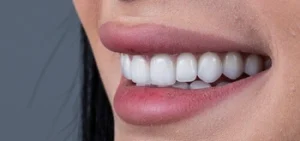If you have dental veneers and are thinking about brightening your smile, you might be wondering whether teeth whitening on veneers is possible. Veneers are a favourable cosmetic dentistry solution for improving the appearance of teeth, but their response to whitening treatments is quite different from that of natural teeth. Before you reach for whitening gels or book a whitening session, it’s important to understand how veneers behave, what you can and cannot do, and the most effective ways to restore their original colour.
Can You Whiten Veneers? The Short Answer
Many people assume veneers can be whitened just like natural teeth, but that’s not the case. Before you try any whitening treatment, it’s worth understanding the science behind why veneers don’t respond the same way as enamel.
The short answer is no, you cannot whiten veneers the same way you whiten natural teeth. Whether you have porcelain veneers or composite veneers, these thin shells are non-porous, meaning they do not absorb whitening agents like natural enamel does. Traditional whitening treatments that work wonders on natural teeth have little to no effect on veneers.
However, this does not mean you are stuck with stained veneers forever. There are effective ways to enhance their appearance, maintain their brightness, and ensure they blend seamlessly with your existing teeth.
Why Veneers Don’t Respond to Whitening
Before trying to whiten veneers, it helps to know why they behave differently from natural teeth. Their unique materials and structure make them highly resistant to staining but also resistant to whitening.
Understanding How Veneers Are Made
Dental veneers are custom made shells designed to bond to the front of your teeth. They are crafted from porcelain or composite resin, both of which are stain-resistant and long lasting. Because of their smooth and non-porous nature, whitening gels cannot penetrate the surface to remove stains.
 Porcelain vs Composite Veneers
Porcelain vs Composite Veneers
- Porcelain veneers are highly resistant to stains and usually retain their colour for many years. They are also stronger and more durable than composite resin.
- Composite veneers, on the other hand, are more porous and prone to staining over time, particularly from coffee, red wine, or tobacco products. However, they are also easier to polish and refresh.
Both types are designed to mimic natural enamel, but they differ in how they age and how they react to whitening treatment.
What Causes Veneer Discolouration?
Even the most stain-resistant veneers can lose their brightness over time. Understanding what causes veneer discolouration can help you prevent it and keep your smile looking fresh.
Even though veneers are stain-resistant, they are not completely immune to discolouration. Over time, certain habits and factors can affect their appearance:
- Surface stains from coffee, tea, red wine, or tobacco products
- Ageing and wear, which can make veneers appear dull
- Stains on surrounding natural teeth, causing a mismatch in shade
- Bonding material discolouration, which can create visible lines near the gum line
It’s also possible for your natural teeth behind or around the veneers to darken, creating a noticeable contrast in colour.
Effective Ways to Brighten Your Smile with Veneers
Although traditional whitening treatments don’t work on veneers, there are reliable and effective ways to restore their appearance. Here are the most common options dentists recommend.
1. Professional Cleaning and Polishing
Sometimes, stained veneers only need a thorough professional cleaning to restore their shine. Your dentist can polish the surface and remove superficial stains without damaging the veneers.
2. Whitening Surrounding Teeth
If your natural teeth have become darker than your veneers, a whitening treatment can help even out the colour. Your dentist will carefully whiten your existing teeth to match the shade of your veneers, creating a more balanced appearance.
3. Veneer Replacement or Refinishing
For veneers that are significantly discoloured or aged, replacement might be the optimal solution. Modern porcelain or composite veneers can be colour-matched to your current smile for a seamless result. Composite veneers can also be refinished or re-layered in one visit to restore their original shade and shape.
Simple Ways to Keep Veneer Stains from Sneaking In
Prevention plays a crucial role in keeping your veneers looking vibrant and maintaining their natural shine. With the right care and daily habits, you can avoid many common causes of staining.
Practising proper dental care and building healthy daily habits can help your veneers stay bright and beautiful for many years. Here’s how:
- Practise regular brushing and flossing to remove plaque and prevent stains from forming.
- Rinse after consuming stain-causing drinks like coffee, tea, or red wine.
- Avoid tobacco products, which can leave stubborn stains on veneers and surrounding teeth.
- Book routine dental visits to have your veneers professionally cleaned and polished.
- Use non-abrasive toothpaste to protect the veneer surface from scratching.
Proper care is especially important for composite veneers, which are more likely to absorb surface stains over time.
At-Home Whitening vs Professional Solutions
 It might be tempting to try whitening veneers at home, but DIY solutions often fall short. Before you use whitening gels or strips, understand what they can and can’t achieve.
It might be tempting to try whitening veneers at home, but DIY solutions often fall short. Before you use whitening gels or strips, understand what they can and can’t achieve.
Some patients try at-home whitening treatments, hoping to whiten veneers the same way they would with natural enamel. While these products can help whiten natural teeth, they will not change the colour of porcelain or composite veneers. Overusing whitening gels at home may even cause uneven colouring, with your natural teeth becoming brighter than your veneers.
A dentist-supervised whitening plan is a safer approach. They can recommend treatments tailored to your smile and ensure the veneer colour matches your desired look.
Temporary Veneers and Whitening Considerations
If you’re in the middle of the veneer process, timing your whitening treatment is crucial. Whitening at the wrong time could affect the final results.
If you are in the process of getting veneers and currently wearing temporary veneers, you should avoid whitening treatments altogether. Whitening can change the shade of your natural teeth and lead to a colour mismatch when your permanent veneers are fitted. Always complete any whitening treatment before getting your final veneers placed.
How Veneers Compare to Crowns in Whitening
Many people with veneers also have crowns, and the same rules apply. Knowing how both restorations react to whitening can help you make the right choices.
Like veneers, dental crowns are also made from stain-resistant materials and do not respond to whitening gels. If you have both veneers and crowns, your dentist will assess the overall shade and may recommend whitening the surrounding teeth or replacing restorations for a uniform colour.
When It’s Time to Visit Your Dentist
If you’re unhappy with the colour of your veneers, professional advice is essential. Your dentist can identify the cause of discolouration and suggest the most effective solution.
If you notice veneer discolouration, do not attempt aggressive whitening at home. A dentist can evaluate the cause, whether it’s surface staining, discolouration of bonding material, or darkening of underlying natural teeth. Based on the assessment, they will recommend the most appropriate solution, whether it’s professional cleaning, teeth whitening, or veneer replacement.
Final Thoughts: How to Keep Your Veneers Bright and Your Smile Radiant
 Whitening veneers is not as straightforward as whitening natural teeth, but it is still possible to keep them looking beautiful with the right approach.
Whitening veneers is not as straightforward as whitening natural teeth, but it is still possible to keep them looking beautiful with the right approach.
Teeth whitening on veneers requires a different approach than whitening natural teeth. Because veneers are made from non-porous, stain-resistant materials, traditional whitening treatments cannot change their colour. Instead, maintaining their brightness involves regular brushing, professional cleaning, lifestyle adjustments, and in some cases, replacing or refinishing them.
With consistent care and routine dental checkups, veneers can stay bright and attractive for many years, helping you preserve a confident smile and the look you originally wanted.
To explore your treatment options and take the first step toward a brighter, healthier smile, contact Advanced Dental Care at (02) 6188 7103.
References
Watson, S. (2025, August 20). Is professional teeth whitening worth it? Verywell Health. Retrieved from https://www.verywellhealth.com/how-is-professional-in-office-teeth-whitening-done-1059032
Watson, K. (2019, December 19). Everything you need to know about tooth polishing. Healthline. Retrieved from https://www.healthline.com/health/teeth-polishing
Cleveland Clinic. (n.d.). Veneers: What are dental veneers? Cost, procedure & advantages. Retrieved from https://my.clevelandclinic.org/health/treatments/23522-dental-veneers







